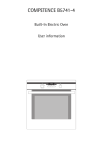Download Electrolux B57415A User's Manual
Transcript
B5741-5 User manual Built-In Electric Oven 2 Dear Customer Thank you for choosing one of our high-quality products. With this appliance you will experience the perfect combination of functional design and cutting edge technology. Convince yourself that our appliances are engineered to deliver the best performance and control - indeed we are setting the highest standards of excellence. In addition to this you find environmental and energy saving aspects as an integral part of our products. To ensure optimal and regular performance of your appliance please read this instruction manual carefully. It will enable you to navigate all processes perfectly and most efficiently. To refer to this manual any time you need to, we recommend you to keep it in a safe place. And please pass it to any future owner of the appliance. We wish you much joy with your new appliance. 3 The following symbols are used in this user manual: Important information concerning your personal safety and information on how to avoid damaging the appliance. General information and tips 2 Environmental information 1 Contents 3 Contents Operating Instructions 5 Safety instructions 5 Description of the Appliance General Overview Control Panel Oven Features Oven Accessories Grill set Before using for the first time Setting and changing the current time Initial cleaning Operating the Oven Switching the Oven On and Off Speedcook Oven Functions Inserting the Oven Shelf and the Roasting Pan Grill set Non-stick accessories Clock Functions Other Functions Switching off the display Oven child safety device Oven automatic cut-out Usage, Tables and Tips Baking Baking table Table for Bakes and Gratins Frozen Ready Meals Table Roasting Roasting table Grill sizes Grilling table Defrosting Defrosting table Drying Making Preserves 7 7 7 8 9 9 10 10 11 12 12 15 16 17 18 18 19 25 25 26 26 27 27 29 34 35 36 36 38 38 39 39 40 41 4 Contents Cleaning and care Outside of the appliance Oven interior Accessories Non-stick accessories Pyrolytic cleaning Shelf Support Rails Oven Lighting Oven door Oven door glass What to do if … 42 42 42 43 43 44 45 46 47 49 53 Electrical Connection 54 Disposal 55 Installation Instructions Safety information for the installer Guarantee/Customer Service 56 56 60 Service and Spare Parts 63 Operating Instructions 5 Operating Instructions 1 Safety instructions Electrical safety • This appliance must be connected by a qualified electrician only. • In the event of a fault or damage to the appliance: take the fuses out or switch off. • Repairs to the appliance must only be carried out by qualified service engineers. Considerable danger may result from improper repairs. If repairs become necessary, please contact your local Service Force Centre. Child Safety • Never leave children unsupervised when the appliance is in use. Safety whilst Using • People (including children) who, because of their physical, sensory or mental capabilities or their inexperience or ignorance are not able to use the device safely, should not use this device without supervision or instruction by a responsible person. • This appliance is intended to be used for cooking, roasting and baking food in the home. • Take care when connecting electric appliances to sockets nearby. Do not allow connecting leads to come into contact with or to catch beneath the hot oven door. • Warning: Risk of burns! The interior of the oven becomes hot during use. • Using ingredients containing alcohol in the oven may create an alcohol-air mixture that is easily ignited. In this case, open the door carefully. Do not have embers, sparks or naked flames in the vicinity when opening the door. 6 Safety instructions How to avoid damage to the appliance • Do not line the oven with aluminium foil and do not place baking trays, pots, etc. on the oven floor, as the heat that builds up will damage the oven enamel. • Fruit juices dripping from the baking tray will leave stains, which you will not be able to remove. For very moist cakes, use a deep tray. • Do not put any strain on the oven door when open. • Never pour water directly into the oven when it is hot. This could cause damage to the enamel and discolouration. • Rough handling, especially around the edges of the front panel, can cause the glass to break. • Do not store any flammable materials inside the oven. These could ignite when the oven is switched on. • Do not store any moist foods inside the oven. This could damage the oven enamel. • After switching off the cooling fan, do not keep uncovered dishes in the oven. Moisture may condense in the oven interior or on the glass doors and may get into the units. 3 Note on enamel coating Changes in the colour of the oven’s enamel coating as a result of use do not affect the appliance’s suitability for normal and correct use. They therefore do not constitute a defect in the sense of the warranty law. Description of the Appliance Description of the Appliance General Overview Control panel Door handle Full glass door Control Panel Oven power indicator Oven power indicator Temperature / Time Display Oven Functions Temperature/Time selection Function buttons 7 8 Description of the Appliance Oven Features Top heat and heating elements Oven lighting Shelf positions Fan heating element Fan Bottom heat Oven shelf runners, removable Inside of door On the inside of the oven door you will find the numbers of the different oven shelves. You will also find some brief information about the oven's functions, recommended shelves and temperatures for cooking the most popular dishes. Description of the Appliance Oven Accessories Oven shelf for non-stick For cookware, cake tins, roasts and grilled foods. Grill set Grill Insert for the roasting pan for roasting and grilling. Roasting Pan For baking and roasting or as a pan for collecting fat. 9 10 Before using for the first time Before using for the first time Setting and changing the current time 3 The oven only operates when the time has been set. When the appliance has been connected to the electrical supply or when there has been a power cut, the function indicator Time flashes automatically. 1. To change a time that has already been set, press the Select button repeatedly until the function indicator Time flashes. 2. Using the rent time. / control knob, set the cur- After approx. 5 seconds, the clock stops flashing and the clock displays the time of day set. 3 The appliance is now ready to use. The time can only be modified, if the child safety device is deactivated, neither of the Countdown , Cook time or End time clock functions and no oven function is set. Before using for the first time 11 Initial cleaning 1 3 Clean the oven before using it for the first time. Important: Do not use caustic or abrasive cleaning agents! These can damage the oven surfaces. For the metal surfaces, use commercially available cleaning agents. 1. Open the oven door. The oven light is illuminated. 2. Remove all oven accessories, and clean them with warm water and a scouring agent. 3. Wash the oven in the same way, and wipe dry. 4. Wipe the front of the appliance with a damp cloth. 12 Operating the Oven Operating the Oven 3 The oven is equipped with retractable buttons for “Oven functions” and “Temperature selection”. To use, press the relevant button. The button then pops out. Switching the Oven On and Off Oven power indicator Temperature / Time Display Oven power indicator Speedcook Heat indicator Button Speedcook Selector Button Oven Functions Change display Temperature/Time selection Operating the Oven Switching the oven on Turn the oven functions selector to the desired function. The power indicator light lights up. The temperature display shows the suggested temperature for the oven function selected. The oven starts to heat up. When the temperature set is reached, an audible signal sounds. Changing the oven temperature Turn the / knob to raise or lower the temperature. The setting changes in 5 °C steps. Checking the temperature Press Speedcook and Select buttons at the same time. The current oven temperature appears in the temperature display. Switching the oven off To turn the oven off, turn the oven functions selector to the OFF position. 13 14 3 Operating the Oven Cooling fan The fan switches on automatically in order to keep the appliance’s surfaces cool. When the oven is switched off, the fan continues to run to cool the appliance down, then switches itself off automatically. 3 Heat indicator Indicates warming up When the oven function has been switched on the bars that slowly light up one after the other indicate how far the oven has heated up. Fast heat indicator When the fast heat function has been switched on the bars that flash one after the other indicate that fast heat is operating. In addition the bars next to the symbol light up. Residual heat indicator When the oven has been switched off, the bars that are still lit indicate the remaining residual heat in the oven. Operating the Oven 15 Speedcook 1 3 After an oven function is selected, with the use of the additional function Speedcook the empty oven can be pre-heated in a relatively short time. Important: Do not put the food to be cooked into the oven, until Speedcook is completed and the oven is operating using the desired function. 1. Set the desired oven function (e. g. Conventional ). If necessary, change the suggested temperature. 2. Press the Speedcook button. The bars next to the symbol light up. When the bars flash one after another it shows that Speedcook is operating. When the temperature set is reached, the bars of the heat indicator light up and the bars next to the symbol go out. An audible signal sounds. The oven now continues heating according to the pre-set oven function and temperature. You can now place the food in the oven. The Speedcook function can be switched on with the oven functions Convection with ring heating element , Pizza setting , Conventional and Rotitherm . 16 Operating the Oven Oven Functions The oven has the following functions: Oven function Use Convection with ring heating element For baking on up to three oven shelves at the same time. Set the oven temperatures 20-40 °C lower than when using Conventional. Pizza setting For baking on one oven level dishes that require more intensive browning and a crispy base. Set the oven temperatures 20-40 °C lower than when using Conventional. Conventional For baking and roasting on one oven level. Rotitherm For roasting larger joints of meat or poultry on one oven shelf. The function is also suitable for browning and gratinbaking. Dual gril For grilling flat food items in large quantities and for toasting. Grill For grilling flat food items arranged in the middle of the grill and for toasting. Defrost For defrosting e. g. gateaux and flans, butter, bread, fruit or other frozen foods. Bottom heat For baking cakes with crispy or crusty bases. Pyroluxe For automatic pyrolytic cleaning of the oven. It burns off residues in the oven, which can then be removed with a cloth when the oven has cooled down. The oven is heated to approx. 500 °C. Operating the Oven 17 Inserting the Oven Shelf and the Roasting Pan 3 Shelf runner safety and anti-tip device As a shelf runner safety device all insertable components have a small curved indentation at the bottom on the right and left-hand edge. Always insert insertable components so that this indentation is at the back of the oven interior. This indentation is also important for preventing the insertable components from tipping. Inserting the roasting pan: Push the roasting pan between the guide bars of the selected oven level. 3 Inserting the oven shelf: Insert the oven shelf so that the feet point downwards. Push the oven shelf between the guide bars of the selected oven level. The high rim around the oven shelf is an additional device to prevent cookware from slipping. Inserting the oven shelf and the roasting pan together: Lay the oven shelf on the roasting pan. Push the roasting pan between the guide bars of the selected oven level. 18 Operating the Oven Grill set 1 The grill set consists of grill and roasting pan. The grill can used on both sides. Warning: There is a risk of burning when removing the rosting pan from the hot oven! Inserting the grill tray underneath: The grill tray rests in the roasting pan. Push the roasting pan between the guide bars of the selected oven level. 3 For roasting larger joints of meat or poultry on one oven shelf. Inserting the grill tray on top: The grill tray rests on the roasting pan. Push the roasting pan between the guide bars of the selected oven level. 3 For grilling flat food items in large quantities and for toasting. Non-stick accessories To ensure that this accessory remains stable and permanently easy to clean, you should follow these instructions: • Do not put accessories into the oven without any food. • Do not place accessories on hot cooking surfaces, as the non-stick properties can be damaged by overheating. Operating the Oven Clock Functions Temperature / Time Display Clock function lights Selector Button Change display Cook time To set how long the oven is to be in use. End time To set when the oven is to switch off again. Countdown To set a countdown. A signal sounds after the time has elapsed. This function does not affect the operation of the oven. Time To set, change or check the time (See also section “Before Using for the First Time”). 19 20 3 Operating the Oven How to use the clock functions • After a clock function has been selected, the corresponding function indicator flashes for about 5 seconds. During this period, the desired times can be set or modified using the / dial. • When the desired time has been set, the function indicator continues to flash for approx. 5 seconds. After that the function indicator is then lit. The set time begins to run in the background. • When the clock functions Cook time and End time have been completed, the oven functions dial must be turned back to “0”. • Using the Display button, you can switch between the oven temperature and the time. 3 Checking the time set or remaining Press the Select button repeatedly, until the appropriate clock function flashes and the time set or remaining is displayed. Operating the Oven Countdown 1. Press the Select button repeatedly until the function indicator Countdown flashes. 2. Using the / control knob set the desired countdown (max. 99.00minutes). The function Countdown indicator lights up. When 90% of the time set has elapsed, an audible signal sounds. When the time has elapsed, “00.00” and the function indicator flash. An audible signal sounds. To stop the flashing and the audible signal: Press any button. 21 22 Operating the Oven Cook time 1. Select the oven function and temperature. 2. Press the Select button repeatedly until the function indicator Cook time flashes. 3. Using the / control knob set the desired cooking time. The Cook time function indicator lights up and the oven comes on immediately. When the time has elapsed, “00.00” and the function indicator flash. An audible signal sounds for 2 minutes. The oven switches itself off. To stop the flashing and the audible signal: Turn the oven functions dial to “0”. Operating the Oven End time 1. Select the oven function and temperature. 2. Press the Select button repeatedly until the End time function indicator flashes. 3. Using the / control knob set the desired switch-off time. The End time function indicator lights up and the oven comes on immediately. When the time has elapsed, “00.00” and the function indicator flash. An audible signal sounds for 2 minutes. The oven switches itself off. To stop the flashing and the audible signal: Turn the oven functions dial to “0”. 23 24 3 Operating the Oven Cook time and End time combined Cook time and End time can be used simultaneously, if the oven is to be switched on and off automatically at a later time. 1. Select the oven function and temperature. 2. Using the Cook time function, set the time that the dish needs to cook. In this example, 1 hour. 3. Using the End time function, set the time at which the dish should be ready. In this case, 14:05. The Cook time and End time function indicators light up and the temperature is shown in the display. In this example, 200°C. The oven switches on automatically at the time calculated. In this case, at 13:05. And switches itself off again when the cook time entered has elapsed. In this case, at 14:05. Operating the Oven Other Functions Switching off the display 2 3 You can save energy by switching off the clock display. Switching off the clock display 1. Turn the / control knob to the right and hold it. 2. In addition press the Select button until the display goes out. As soon as the appliance is switched on again, the display comes on automatically. When the appliance is next switched off, the clock display goes out again. To have the clock display on permanently again, you must set the clock again. Switching on the clock display 1. Turn the / control knob to the right and hold it. 2. In addition press the Select button, until the display appears again. 25 26 Operating the Oven Oven child safety device 3 The oven is fitted with a child safety device. As soon as the child safety device is activated, the oven cannot be switched on. For the child safety device to be activated, none of the oven functions must be currently selected. Activating the child safety device 1. Turn the / dial to the left and hold it. 2. In addition press the Select button until “SAFE” appears in the display. The child safety device is now activated. Deactivating the child safety device 1. Turn the / dial to the left and hold it. 2. In addition press and hold the Select button, until “SAFE” disappears from the display. The child safety device is now deactivated and the oven is again ready for use. Oven automatic cut-out 3 If not switched off after a certain time, or if the temperature is not modified, the oven switches off automatically. The last temperature set flashes in the temperature display. The oven switches off when the oven temperature is: 30 - 120°C 120 - 200°C 200 - 250°C 250 - max°C 3 after after after after 12.5 hours 8.5 hours 5.5 hours 3.0 hours Switching on after an automatic cut-out Switch the oven off completely. It can then be switched on again. The automatic cut-out is cancelled if the clock function Cook time time is set. or End Usage, Tables and Tips 27 Usage, Tables and Tips Baking Oven function: Convection with ring heating element or Conventional Baking tins • For Conventional dark metal and non-stick tins are suitable. • For Convection with ring heating element bright metal tins are also suitable. Oven levels • Baking with Conventional is possible on one oven level. • Using Convection with ring heating element you can bake on up to 3 baking trays at the same time: 1 baking tray: e.g. oven level 3 1 cake tin: e.g. oven level 1 2 baking trays: e. g. oven levels 1 and 3 3 baking trays: oven levels 1, 3 and 5 28 3 2 Usage, Tables and Tips General Instructions • Insert the tray with the bevel at the front. • With Conventional or Convection with ring heating element you can also bake with two tins next to one another on the oven shelf at the same time. This does not significantly increase baking time. When frozen foods are used the trays inserted may distort during cooking. This is due to the large difference in temperature between the freezing temperature and the temperature in the oven. Once the trays have cooled the distortion will disappear again. How to use the Baking Tables The tables give the required temperature settings, baking times and oven shelf levels for a selection of typical dishes. • Temperatures and baking times are for guidance only, as these will depend on the consistency of pastry or mixture, the number and the type of baking tin. • We recommend using the lower temperature the first time and then if necessary, for example, if a deeper browning is required, or baking time is too long, selecting a higher temperature. • If you cannot find the settings for a particular recipe, look for the one that is most similar. • If baking cakes on baking trays or tins on more than one level, baking time can be extended by 10-15 minutes. • Moist recipes (for g. pizzas, fruit flans, etc.) are baked on one level. • Cakes and pastries at different heights may brown at an uneven rate at first. If this occurs, please do not change the temperature setting. Different rates of browning even out as baking progresses. • Your new oven may bake or roast differently to your previous appliance. So adapt your normal settings (temperature, cooking times) and oven shelf levels to the recommendations in the following tables. With longer baking times, you can switch the oven off about 10 minutes before the end of the baking time, in order to utilise the residual heat. Unless otherwise stated, the values given in the tables assume that cooking is started with the oven cold. Usage, Tables and Tips 29 Baking table Baking on one oven level Type of baking Oven function Oven level Temperature °C Time Hr: Mins. Baking in tins Ring cake or brioche Convection with ring heating element 1 150-160 0:50-1:10 Madeira cake/fruit cakes Convection with ring heating element 1 140-160 1:10-1:30 Sponge cake Convection with ring heating element 1 140 0:25-0:40 Sponge cake Conventional 1 160 0:25-0:40 1) Flan base - short pastry Convection with ring heating element 3 170-180 0:10-0:25 Flan base - sponge mixture Convection with ring heating element 3 150-170 0:20-0:25 Apple pie Conventional 1 170-190 0:50-1:00 Apple pie (2tins Ø20cm, diagonally off set) Convection with ring heating element 1 160 1:10-1:30 Apple pie (2tins Ø20cm, diagonally off set) Conventional 1 180 1:10-1:30 Savoury flan (e. g, quiche lorraine) Convection with ring heating element 1 160-180 0:30-1:10 Conventional 1 170-190 1:00-1:30 Cheesecake Cakes/pastries/breads on baking trays Plaited bread/bread crown Conventional 3 170-190 0:30-0:40 Christmas stollen Conventional 3 160-1801) 0:40-1:00 Bread (rye bread) -first of all -then Conventional 1 2301) 160-180 0:25 0:30-1:00 Cream puffs/eclairs Conventional 3 160-1701) 0:15-0:30 3 1) 0:10-0:20 Swiss roll Conventional 180-200 30 Usage, Tables and Tips Type of baking Oven function Oven level Temperature °C Time Hr: Mins. Cake with crumble topping (dry) Convection with ring heating element 3 150-160 0:20-0:40 Buttered almond cake/sugar cakes Conventional 3 190-2101) 0:15-0:30 Fruit flans (made with yeast dough/ sponge mixture)2) Convection with ring heating element 3 150 0:35-0:50 Fruit flans (made with yeast dough/ sponge mixture)2) Conventional 3 170 0:35-0:50 Fruit flans made with short pastry Convection with ring heating element 3 160-170 0:40-1:20 Yeast cakes with delicate toppings (e. g, quark, cream, custard) Conventional 3 160-1801) 0:40-1:20 Pizza (with a lot of topping)2) Convection with ring heating element 1 180-2001) 0:30-1:00 Pizza (thin crust) Convection with ring heating element 1 200-2201) 0:10-0:25 Unleavened bread Convection with ring heating element 1 200-220 0:08-0:15 Tarts (CH) Convection with ring heating element 1 180-200 0:35-0:50 Short pastry biscuits Convection with ring heating element 3 150-160 0:06-0:20 Viennese whirls Convection with ring heating element 3 140 0:20-0:30 Viennese whirls Conventional 3 1601) 0:20-0:30 Convection with ring heating element 3 150-160 0:15-0:20 Biscuits Biscuits made with sponge mixture Usage, Tables and Tips Type of baking Oven function 31 Oven level Temperature °C Time Hr: Mins. Pastries made with egg white, meringues Convection with ring heating element 3 80-100 2:00-2:30 Macaroons Convection with ring heating element 3 100-120 0:30-0:60 Biscuits made with yeast dough Convection with ring heating element 3 150-160 0:20-0:40 Puff pastries Convection with ring heating element 3 170-1801) 0:20-0:30 Rolls Convection with ring heating element 3 1601) 0:20-0:35 Rolls Conventional 3 1801) 0:20-0:35 0:20-0:30 0:20-0:30 Small cakes (20per tray) Convection with ring heating element 3 1401) Small cakes (20per tray) Conventional 3 1701) 1) Pre-heat the oven 2) Use the drip tray or roasting tray 32 Usage, Tables and Tips Baking on more than one oven level Type of baking Convection with ring heating element Convection with ring heating element Shelf positions from bottom 2 levels 3 levels Temperature in °C Time Hours: Mins. Cakes/pastries/biscuits on baking trays Cream puffs/Eclairs 1/4 --- 160-1801) 0:35-0:60 Dry streusel cake 1/3 --- 140-160 0:30-0:60 Short pastry biscuits 1/3 1/3/5 150-160 0:15-0:35 Viennese whirls 1/3 1/3/5 140 0:20-0:60 Biscuits made with sponge mixture 1/3 --- 160-170 0:25-0:40 Pastries made with egg white, meringues 1/3 --- 80-100 2:10-2:50 Macaroons 1/3 --- 100-120 0:40-1:20 Biscuits made with yeast dough 1/3 --- 160-170 0:30-0:60 0:30-0:50 Biscuits Puff pastries 1/3 --- 170-1801) Rolls 1/4 --- 160 0:30-0:45 Small cakes (20per tray) 1/4 --- 1401) 0:25-0:40 1) Pre-heat the oven! Usage, Tables and Tips 33 Tips on Baking Baking results Possible cause Remedy The cake is not browned enough at the bottom Wrong shelf level Place cake on a lower shelf The cake sinks (becomes soggy, lumpy, streaky) Oven temperature too high Use a slightly lower temperature setting Baking time too short Increase baking time Baking times cannot be reduced by setting higher temperatures Too much liquid in the dough/ mixture Use less liquid Pay attention to mixing times, especially if using mixing machines Oven temperature too low Increase oven temperature Baking time too long Shorten baking time Oven temperature too high and baking time too short Set a lower temperature and increase baking time Dough/mixture is unevenly distributed Spread the dough/mixture evenly on the baking tray Cake is too dry Cake browns unevenly Cake is not cooked with- Temperature too low in the baking time set Use a slightly higher temperature setting 34 Usage, Tables and Tips Pizza setting table Shelf position Temperature °C Time Hr: Mins. Pizza (thin crust) 1 180 - 2001) 20 - 30 Pizza (with a lot of topping) 1 180 - 200 20 - 30 Tarts 1 180 - 200 45 - 60 Spinach flan 1 160 -180 45 - 60 Quiche Lorraine 1 170 - 190 40 - 50 Quark flan, round 1 140 - 160 60 - 90 Quark flan on the tray 1 140 - 160 50 - 60 Apple cake, covered 1 150 - 170 50 - 70 Vegetable pie 1 160 - 180 50 - 60 Unleavened bread 1 250 - 2701) 10 - 20 Puff pastry flan 1 160 - 1801) 40 - 50 Flammekuchen (Pizza-like dish from Alsace) 1 250 - 2701) 12 - 20 Piroggen (Russian version of calzone) 1 180 - 2001) 15 - 25 Type of baking 1) Pre-heat the oven Table for Bakes and Gratins Dish Pasta bake Lasagne Shelf position Temperature °C Time Hr: Mins. Conventional 1 180-200 0:45-1:00 Oven function Conventional 1 180-200 0:25-0:40 Vegetables au gratin1) Convection with ring heating element 1 160-170 0:15-0:30 Baguettes topped with melted cheese1) Convection with ring heating element 1 160-170 0:15-0:30 Sweet bakes Conventional 1 180-200 0:40-0:60 Fish bakes Conventional 1 180-200 0:30-1:00 Convection with ring heating element 1 160-170 0:30-1:00 Stuffed vegetables 1) Pre-heat the oven Usage, Tables and Tips 35 Frozen Ready Meals Table Food to be cooked Shelf position Temperature °C Time Conventional 3 as per manufacturer’s instructions as per manufacturer’s instructions Convection with ring heating element 3 200-220 as per manufacturer’s instructions Baguettes Conventional 3 as per manufacturer’s instructions as per manufacturer’s instructions Fruit flans Conventional 3 as per manufacturer’s instructions as per manufacturer’s instructions Frozen pizza Chips1) (500 g) Oven function 1) Comments: Turn chips 2 or 3 times during cooking 36 Usage, Tables and Tips Roasting Oven function: Conventional or Rotitherm Roasting dishes • Any heat-resistant ovenware is suitable for roasting. (Please read the manufacturer's instructions.) • Large roasting joints can be cooked directly in the tray or on the shelf with the tray placed below • For all lean meat, we recommend roasting these in a roasting tray with a lid. This makes the meat more succulent. • All types of meat, that can be browned or have crackling, can be roasted in the roasting tin without the lid. 3 Tips on using the roasting chart The figures in the following table are for guidance only. • We recommend cooking meat and fish over 1 kg in weight in the oven. • To prevent escaping meat juices or fat from burning on to the pan, we recommend placing some water in the roasting pan. • Turn the meat as required (after about 1/2 - 2/3 of cooking time). • Baste large roasting joints and poultry several times during the cooking time. This will give better roasting results. • Switch off the oven approx. 10 minutes prior to the end of the cooking time in order to use the residual heat. Roasting table Type of meat Quantity Ovenfunction Shelf position TemperaTime ture Hours mins. °C Beef Pot roast 1-1.5 kg Conventional 1 200-250 2:00-2:30 per cm. of thickness Roast beef or fillet - rare per cm. of thickness Rotitherm 1 190-2001) 0:05-0:06 - medium per cm. of thickness Rotitherm 1 180-190 0:06-0:08 - well done per cm. of thickness Rotitherm 1 170-180 0:08-0:10 Pork Usage, Tables and Tips Shelf position 37 TemperaTime ture Hours mins. °C Type of meat Quantity Ovenfunction Shoulder, neck, ham joint 1-1.5 kg Rotitherm 1 160-180 1:30-2:00 Chop, spare rib 1-1.5 kg Rotitherm 1 170-180 1:00-1:30 Meat loaf 750 g-1 kg Rotitherm 1 160-170 0:45-1:00 Porkknuckle (pre-cooked) 750 g-1 kg Rotitherm 1 150-170 1:30-2:00 1 kg Rotitherm 1 160-180 1:30-2:00 1.5-2 kg Rotitherm 1 160-180 2:00-2:30 Leg of lamb, roast lamb 1-1.5 kg Rotitherm 1 150-170 1:15-2:00 Saddle of lamb 1-1.5 kg Rotitherm 1 160-180 1:00-1:30 Saddle of hare, leg of hare up to 1 kg Conventional 3 220-2501) 0:25-0:40 Saddle of venison 1.5-2 kg Conventional 1 210-220 1:15-1:45 Haunch of venison 1.5-2 kg Conventional 1 200-210 1:30-2:15 Poultry portions 200-250g each Rotitherm 1 200-220 0:35-0:50 Half chicken 400-500g each Rotitherm 1 190-210 0:35-0:50 Chicken, poulard 1-1.5 kg Rotitherm 1 190-210 0:45-1:15 Duck 1.5-2 kg Rotitherm 1 180-200 1:15-1:45 Goose 3.5-5 kg Rotitherm 1 160-180 2:30-3:30 Turkey 2.5-3.5 kg Rotitherm 1 160-180 1:45-2:30 Turkey 4-6 kg Rotitherm 1 140-160 2:30-4:00 1-1.5 kg Conventional 1 210-220 0:45-1:15 Veal Roast veal Knuckle of veal Lamb Game Poultry Fish (steamed) Whole fish 1) Pre-heat the oven 38 Usage, Tables and Tips Grill sizes 1 3 Oven function: Grill or Dual gril with maximum temperature setting Important: Always grill with the oven door closed. The empty oven should always be pre-heated with the grill functions for 5 minutes. • For grilling, place the shelf in the recommended shelf position. • Always insert the tray for collecting the fat into the first shelf position from the bottom. • The grilling times are for guidance only. • Grilling is particularly suitable for flat pieces of meat or fish. Grilling table Food to be grilled Oven level Grilling time 1st side 2nd side Burgers 4 8-10 mins. 6-8 mins. Pork fillet 4 10-12 mins. 6-10 mins. Sausages 4 8-10 mins. 6-8 mins. Fillet steaks, veal steaks 4 6-7 mins. 5-6 mins. Fillet of beef, roast beef (approx. 1 kg) 3 10-12 mins. 10-12 mins. 3 4-6 mins. 3-5 mins. 3 6-8 mins. --- Toast 1) Toast with topping 1) Do not pre-heat Usage, Tables and Tips 39 Defrosting Oven function: Defrost (no temperature setting) • Unpack the food and place it on a plate on the oven shelf. • Do not cover with a plate or bowl, as these can substantially lengthen the defrosting time. • For defrosting, place the shelf on the 1st oven level from the bottom. Defrosting table Defrosting time Min. Further defrosting time (mins.) Chicken, 1000 g 100-140 20-30 Place the chicken on an upturned saucer placed on a large plate. Halfway through the time, turn it over Meat, 1000 g 100-140 20-30 Halfway through the time, turn it over Meat, 500 g 90-120 20-30 Halfway through the time, turn it over Trout, 150g 25-35 10-15 --- Strawberries, 300g 30-40 10-20 --- Butter, 250g 30-40 10-15 --- Cream, 2 x 200g 80-100 10-15 Cream that is still slightly frozen in part can still be whipped 60 60 Food Flan/gateau, 1400g Comments --- 40 Usage, Tables and Tips Drying Oven function: Convection with ring heating element • Use oven shelves covered with greaseproof paper or baking parchment. • You get a better result if you switch the oven off halfway through the drying time, open the door and leave the oven to cool down overnight. • After this finish drying the food to be dried. Oven level Temperature in °C 1 level 2 levels Time in hours (Guideline) Beans 60-70 3 1/4 6-8 Peppers (strips) 60-70 3 1/4 5-6 Vegetables for soup 60-70 3 1/4 5-6 Mushrooms 50-60 3 1/4 6-8 Herbs 40-50 3 1/4 2-3 Plums 60-70 3 1/4 8-10 Apricots 60-70 3 1/4 8-10 Apple slices 60-70 3 1/4 6-8 Pears 60-70 3 1/4 6-9 Food to be dried Vegetables Fruit Usage, Tables and Tips 41 Making Preserves Oven function: Bottom heat • For preserving, use only commercially available preserve jars of the same size. • Jars with twist-off or bayonet type lids and metal tins are not suitable. • When making preserves, use the first shelf position from the bottom. • Use the baking tray for making preserves. There is enough room on this for up to six 1-litre preserving jars. • The jars should all be filled to the same level and clamped shut. • Place the jars on the baking tray in such a way that they are not touching each other. • Pour approx. 1/2 litre of water into the baking tray so that sufficient moisture is produced in the oven. • As soon as the liquid in the first jars starts to simmer (after approx. 35-60 minutes for 1 litre jars), switch off the oven or adjust the temperature to 100°C (see table). Preserves table The times and temperatures for making preserves are for guidance only. Temperature in°C Cooking time until simmering in mins. Continue to cook at 100°C in mins. Strawberries, blueberries, raspberries, ripe gooseberries 160-170 35-45 --- Unripe gooseberries 160-170 35-45 10-15 160-170 35-45 10-15 Carrots1) 160-170 50-60 5-10 Mushrooms1) 160-170 40-60 10-15 Cucumbers 160-170 50-60 --- Mixed pickles 160-170 50-60 15 Kohlrabi, peas, asparagus 160-170 50-60 15-20 Beans 160-170 50-60 --- Preserve Soft fruit Stone fruit Pears, quinces, plums Vegetables 1) Leave standing in oven when switched off 42 Cleaning and care Cleaning and care 1 Warning: First switch off the appliance and let it cool down before carrying out any cleaning. Warning: For safety reasons, do not clean the appliance with steam blasters or high-pressure cleaners. Attention: Do not use any corrosive cleaning fluids, sharp objects or stain removers. Do not clean the glass oven door with abrasive fluids or metal scrapers, which could scratch the surface. The glass could crack and shatter. Outside of the appliance • Wipe the front of the appliance with a soft cloth and a solution of hot water and washing up liquid. • For metal fronts, use normal commercially available cleaning agents. • Please do not use scouring agents and abrasive sponges. Oven interior 1 3 3 1 Warning: make sure the oven is switched off and has cooled down before cleaning. Clean the appliance after each use. In this way, dirt is easier to clean off and is not allowed to burn on. Residues that are not removed may cause changes to the surface colour when Pyroluxe is used. 1. The oven light switches on automatically when the oven door is opened. 2. After every use, wipe the oven with a solution of water and washing-up liquid and allow to dry. In the event of stubborn dirt, clean using Pyroluxe. Important! If you use an oven spray, please follow the manufacturer’s instructions exactly. Cleaning and care 43 Accessories Wash all slide-in units (shelf unit, baking tray, shelf support rails etc.) after each use and dry well. Soak briefly to make them easier to clean. Non-stick accessories 3 1 1 Clean accessories with a soft sponge or cloth in hot water and washing-up liquid. Bright spots in the coating do not mean that the surface is damaged. Important: Do not use any aggressive or scouring cleaning agents, spray oven cleaners, steel soap pads or hard objects such as knives or sharpedged scrapers. These destroy the coating. Important: Do not clean these accessories in the dishwasher. The non-stick properties would be lost as a result. 44 Cleaning and care Pyrolytic cleaning 1 1 3 3 3 Warning: The oven gets extremely hot during this process. Young children must be kept away. Important! Before carrying out pyrolytic cleaning, all removable parts including the side rails, must be removed from the oven. If you use the oven shelf runners that are available as special accessories, these must be removed before pyrolytic cleaning. If the side rails or oven shelf runners are still in place, ‘C1’ appears in the clock display. The pyrolytic cleaning process then cannot be started due to a safety cut-out that protects the side rails/oven shelf runners. Pyrolytic cleaning 1. First remove the worst of the residue manually. 2. Select oven function Pyroluxe . – “3:15” appears in the display, – Cook time flashes for approx. 5 seconds. Pyrolytic cleaning then starts. The Light does not work. When a pre-set temperature is reached, the door is locked. The bars of the heat indicator light up, until the door is unlocked again. Changing the length of time for the pyrolytic cleaning 1. Proceed as described in the section “Pyrolytic cleaning”. 2. As long as Cook time is flashing, select the desired length for the process using or : “ / 2:15” or “3:15” Cook time flashes for approx. 5 seconds. Pyrolytic cleaning then starts. If Cook time is no longer flashing, press the Select button again and then perform the setting procedure. Changing the switch-off time for the pyrolytic cleaning The switch-off timecan be delayed using the clock function End time (within 2 minutes of the pyrolytic cleaning starting). When the different processes for pyrolytic cleaning are set: P2 - 2:15 = Pyroluxe easy: For a light degree of soiling, P1 - 3:15 = Pyroluxe intensive: For a high degree of soiling. Cleaning and care 45 Shelf Support Rails The shelf support rails on the left and right hand sides of the oven can be removed for cleaning the side walls. Removing the shelf support rails First pull the front of the rail away from the oven wall (1) and then unhook at the back (2). 3 Fitting the shelf support rails Important! The rounded ends of the guide rails must be pointing forwards! To re-insert, first hook the rail into place at the back (1) and then insert the front and press into place (2). 46 Cleaning and care Oven Lighting 1 3 Warning: There is a danger of electric shock! Prior to changing the oven light bulb: – Switch off the oven! – Disconnect from the electricity supply. Place a cloth on the oven floor to protect the oven light and glass cover. Replacing the oven light bulb/cleaning the glass cover 1. Remove the glass cover by turning it anticlockwise and then clean it. 2. If necessary: Replace bulb with a 40 watt, 230 V, 300 °C heat-resistant oven light bulb. 3. Refit the glass cover. Cleaning and care 47 Oven door For easier cleaning of the oven interior, the oven door can be taken off its hinges. Removing the oven door from its hinges 1. Open the oven door as far as it will go. 2. Undo the clamping levers (A) on both door hinges fully. 3. Close the oven door as far as the first position (approx. 45°). 3 4. Take hold of the oven door with a hand on each side and pull it away from the oven at an upwards angle (Take care: It is heavy). Lay the oven door with the outer side facing downwards on something soft and level, for example, a blanket in order to prevent scratches. 48 Cleaning and care Hanging the oven door back on its hinges 1. From the handle side take hold of the oven door with a hand on each side and hold at an angle of approx. 45°. Position the recesses on the bottom of the oven door on the hinges on the oven. Let the door slide down as far as it will go. 2. Open the oven door as far as it will go. 3. Fold up the clamping levers (A) on both door hinges back into their original positions. 4. Close the oven door. Cleaning and care 49 Oven door glass 1 The oven door is fitted with four panels of glass mounted one behind the other. The inner panels can be removed for cleaning. Important Rough handling, especially around the edges of the front panel, can cause the glass to break. Removing door glass panels 1. Open the oven door as far as it will go. 2. Undo the clamping levers (A) on both door hinges fully. 3. Close the oven door as far as the first position (approx. 45°). 4. Take hold of the door trim (B) on the upper edge of the door at both sides and press inwards to release the clip seal. Then remove the door trim by pulling it upwards. 50 Cleaning and care 5. Take hold of the door glass panels on their upper edge one after the other and take them out of the guide by pulling them upwards. Cleaning the door glass panels Clean the door glass panels thoroughly with a solution of water and washing up liquid. Then dry them carefully. Cleaning and care 3 Putting the door glass panels back. 1. From above insert the door glass panels one after the other into the door profile at the bottom edge of the door at an angle and lower them. The two smaller panels first, then the larger panel. 2. Take hold of the door trim (B) at each side, position it on the inside edge of the door and plug the door trim (B) into the upper edge of the door. 3 On the open side of the door trim (B) there is a guide bar (C). This must be pushed between the outer door panel and the guide corner (D). The clip seal (E) must be snapped in. 51 52 Cleaning and care 3. Open the oven door as far as it will go. 4. Fold up the clamping levers (A) on both door hinges back into their original positions. 5. Close the oven door. What to do if … 53 What to do if … Problem The oven does not heat up Possible cause Remedy The oven is not switched on Switch the oven on The clock has not been set Set the current time on the clock The required settings have not Check the settings been set The oven’s automatic cut-out has been triggered. See Automatic cut-out The fuse in the house’s electri- Check fuse. If the fuses trip recal wiring (fuse box) has been peatedly, please call an autripped thorised electrician 1 3 3 The oven lighting is not operating The oven bulb is faulty Change the oven bulb Pyroluxe is not working (“C1” appears in the display) Side rails/oven shelf runners have not been removed Remove side rails/oven shelf runners F2 appears in the clock display Door not properly closed or door lock defective Close door properly; Turn the appliance off and on again via the house fuse or the safety switch in the fuse box; If displayed again, please contact the Customer Care Department In the clock display there appears a fault code that is not listed above Switch off the appliance via the house fuse or the safety switch in the fuse box and switch it on again. If displayed again, please contact your local Service Force Centre. Fault in the electronics If you are unable to remedy the problem by following the above suggestions, please contact your local Service Force Centre. Warning! Repairs to the appliance are only to be carried out by qualified service engineers. Considerable danger to the user may result from improper repairs. If the appliance has been operated incorrectly, the engineer's visit will be chargeable, even during the warranty period. Advice on cookers with metal fronts: Because of the cooler surface at the front of the cooker, opening the oven door during (or just after) baking or roasting may cause the glass to steam up. 54 Electrical Connection Electrical Connection The oven is designed to be connected to 230-240V~(50Hz) electricity supply. The oven has an easily accessible terminal block which is marked as follows: Letter L Live terminal Letter N Neutral terminal E Earth terminal 1 This oven must be earthed! The cable used to connect the oven to the electrical supply must comply to the specifications given below. For UK use only Connection via Cooker Control Circuit Min. size Cable/flex 2,5 mm2 Cable/flex type PVC/PVC twin and earth Fuse min: 15A max: 20A It is necessary that you install a double pole switch between the oven and the electricity supply (mains), with a minimum gap of 3mm between the switch contacts and of a type suitable for the required load in compliance with the current regulations. The switch must not break the yellow and green earth cable at any point. Important After installation and connecting, the cable must be placed so that it cannot at any point reach a temperature of more than 50°C above the ambient temperature. Before the oven is connected, check that the main fuse and the domestic installation can support the load; and that the power supply is properly earthed. The manufacturer declines any responsibility should these safety measures not be carried out. Disposal 55 Disposal 2 Packaging material The packaging materials are environmentally friendly and can be recycled. The plastic components are identified by markings, e.g. >PE<, >PS<, etc. Please dispose of the packaging materials in the appropriate container at your local waste disposal facilities. 2 Old appliance W 1 The symbol on the product or on its packaging indicates that this product may not be treated as household waste. Instead it shall be handed over to the applicable collection point for the recycling of electrical and electronic equipment. By ensuring this product is disposed of correctly, you will help prevent potential negative consequences for the environment and human health, which could otherwise be caused by inappropriate waste handling of this product. For more detailed information about recycling of this product, please contact your local city office, your household waste disposal service or the shop where you purchased the product. Warning: Before disposing of old appliances please make them inoperable so that they cannot be a source of danger. To do this, disconnect the appliance from the mains supply and remove the mains cable from the appliance. 56 Installation Instructions Installation Instructions 1 1 Attention: The new appliance may only be installed and connected by a registered expert. Please comply with this. If you do not, any damage resulting is not covered by the warranty. Safety information for the installer • The electrical installation is to be set up so that the appliance can be isolated from the mains with a minimum 3mm all-pole contact separation. Suitable separation devices include e.g. cut-outs, fuses (screw fuses are to be taken out of the holder), RCD’s and contactors. • Anti-shock protection must be provided by the installation. • The built-in unit must meet the stability requirements of DIN 68930. • Built-in ovens and built-in cooking surfaces are fitted with special connection systems. For safety reasons, they must only be combined with appliances from the same manufacturer. The use of thermal insulation bars is not permitted in cookers with Pyroluxe, if the recess has a back wall and a solid shelf. However with a shelf shortened by at least 20 mm and ventilation in the plinth of the same diameter, it becomes possible to build-in. Installation Instructions 57 58 Installation Instructions Installation Instructions 59 60 Guarantee/Customer Service Guarantee/Customer Service Standard guarantee conditions We, AEG-Electrolux, undertake that if within 12 months of the date of the purchase this AEG-Electrolux appliance or any part thereof is proved to be defective by reason only of faulty workmanship or materials, we will, at our option repair or replace the same FREE OF CHARGE for labour, materials or carriage on condition that: • The appliance has been correctly installed and used only on the electricity supply stated on the rating plate. • The appliance has been used for normal domestic purposes only, and in accordance with the manufacturer’s instructions. • The appliance has not been serviced, maintained, repaired, taken apart or tampered with by any person not authorised by us. • Electrolux Service Force Centre must undertake all service work under this guarantee • Any appliance or defective part replaced shall become the Company’s property. • This guarantee is in addition to your statutory and other legal rights. Exclusions • Damage or calls resulting from transportation, improper use or neglect, the replacement of any light bulbs or removable parts of glass or plastic. • Costs incurred for calls to put right an appliance which is improperly installed or calls to appliances outside the United Kingdom. • Appliances found to be in use within a commercial environment, plus those which are subject to rental agreements. • Products of Electrolux manufacturer that are not marketed by Electrolux Guarantee/Customer Service 61 European Guarantee This appliance is guaranteed by Electrolux in each of the countries listed at the back of this user manual, for the period specified in the appliance guarantee or otherwise by law. If you move from one of these countries to another of the countries listed below the appliance guarantee will move with you subject to the following qualifications: • The appliance guarantee starts from the date you first purchased the appliance which will be evidenced by production of a valid purchase document issued by the seller of the appliance. • The appliance guarantee is for the same period and to the same extent for labour and parts as exists in your new country of residence for this particular model or range of appliances. • The appliance guarantee is personal to the original purchaser of the appliance and cannot be transferred to another user. • The appliance is installed and used in accordance with instructions issued by Electrolux and is only used within the home, i.e. is not used for commercial purposes. • The appliance is installed in accordance with all relevant regulations in force within your new country of residence. The provisions of this European Guarantee do not affect any of the rights granted to you by law. www.electrolux.com p t b Albania +35 5 4 261 450 Rr. Pjeter Bogdani Nr. 7 Tirane Belgique/België/ Belgien +32 2 363 04 44 Bergensesteenweg 719, 1502 Lembeek Èeská republika +420 2 61 12 61 12 Budìjovická 3, Praha 4, 140 21 Danmark +45 70 11 74 00 Sjællandsgade 2, 7000 Fredericia Deutschland +49 180 32 26 622 Muggenhofer Str. 135, 90429 Nürnberg Eesti +37 2 66 50 030 Mustamäe tee 24, 10621 Tallinn España +34 902 11 63 88 Carretera M-300, Km. 29,900 Alcalá de Henares Madrid France www.electrolux.fr Great Britain +44 8705 929 929 Addington Way, Luton, Bedfordshire LU4 9QQ Hellas +30 23 10 56 19 70 4 Limnou Str., 54627 Thessaloniki Hrvatska +385 1 63 23 338 Slavonska avenija 3, 10000 Zagreb Ireland +353 1 40 90 753 Long Mile Road Dublin 12 Italia +39 (0) 434 558500 C.so Lino Zanussi, 26 - 33080 Porcia (PN) Latvija +37 17 84 59 34 Kr. Barona iela 130/2, LV-1012, Riga Lithuania +3702780607 Žirmūnų 67, LT-09001 Vilnius Luxembourg +352 42 431 301 Rue de Bitbourg, 7, L-1273 Hamm Magyarország +36 1 252 1773 H-1142 Budapest XIV, Erzsébet királyné útja 87 Nederland +31 17 24 68 300 Vennootsweg 1, 2404 CG Alphen aan den Rijn Norge +47 81 5 30 222 Risløkkvn. 2 , 0508 Oslo 62 Guarantee/Customer Service p t b Österreich +43 18 66 400 Herziggasse 9, 1230 Wien Polska +48 22 43 47 300 ul. Kolejowa 5/7, Warszawa Portugal +35 12 14 40 39 39 Quinta da Fonte - Edificio Gonçalves Zarco - Q 35 2774 - 518 Paço de Arcos Romania +40 21 451 20 30 Str. Garii Progresului 2, S4, 040671 RO Schweiz/Suisse/ Svizzera +41 62 88 99 111 Industriestrasse 10, CH-5506 Mägenwil Slovenija +38 61 24 25 731 Electrolux Ljubljana d.o.o. Gerbièeva 98, 1000 Ljubljana Slovensko +421 2 43 33 43 22 Electrolux Slovakia s.r.o., Electrolux Domáce spotrebièe SK, Seberíniho 1, 821 03 Bratislava Suomi www.electrolux.fi Sverige +46 (0)771 76 76 76 Electrolux Service, S:t Göransgatan 143, S-105 45 Stockholm Türkiye +90 21 22 93 10 25 Tarlabaþý caddesi no : 35 Taksim Istanbul Ðîññèÿ +7 495 937 7837 129090 Ìîñêâà, Îëèìïèéñêèé ïðîñïåêò, 16, ÁÖ „Îëèìïèê“ Óêðà¿íà +380 44 586 20 60 04074 Êè¿â, âóë.Àâòîçàâîäñüêà, 2a, ÁÖ „Àëêîí“ Service and Spare Parts 63 Service and Spare Parts If the event of your appliance requiring service, or if you wish to purchase spare parts, please contact Service Force by telephoning: 0870 5 929 929 Your telephone call will be automatically routed to the Service Force Centre covering your post code area. For the address of your local Service Force Centre and further information about Service Force, please visit the website at www. serviceforce.co.uk Before calling out an engineer, please ensure you have read the details under the heading „What to do if...“ When you contact the Service Force Centre you will need to give the following details: 1. Your name, address and post code. 2. Your telephone number. 3. Clear and concise details of the fault. 4. The model and serial number of the appliance (found on the rating plate) 5. The purchase date. Please note that a valid purchase receipt or guarantee documentation is required for inguarantee service calls. Customer Care For general enquiries concerning your AEG appliance, or for further information on AEG products please contact our Customer Care Department by letter or telephone at the address below or visit our website at www.aeg.co.uk. Customer Care Department For Customer Service in the Republic of Major Appliances Ireland please contact us at the address beAEG Domestic Appliances low: Addington Way AEG/ Electrolux Group (Ire) Ltd Luton Long Mile Road/ Dublin 12 Bedfordshire, LU4 9QQ Republic of Ireland Tel: 08705 350350 (*) Tel: +353 (0) 1 4090754 Email: [email protected] (*) Calls may be recorded for training purposes 822 929 963-M-291107-01 Subject to change without notice www.electrolux.com www.aeg-electrolux.co.uk





















































































